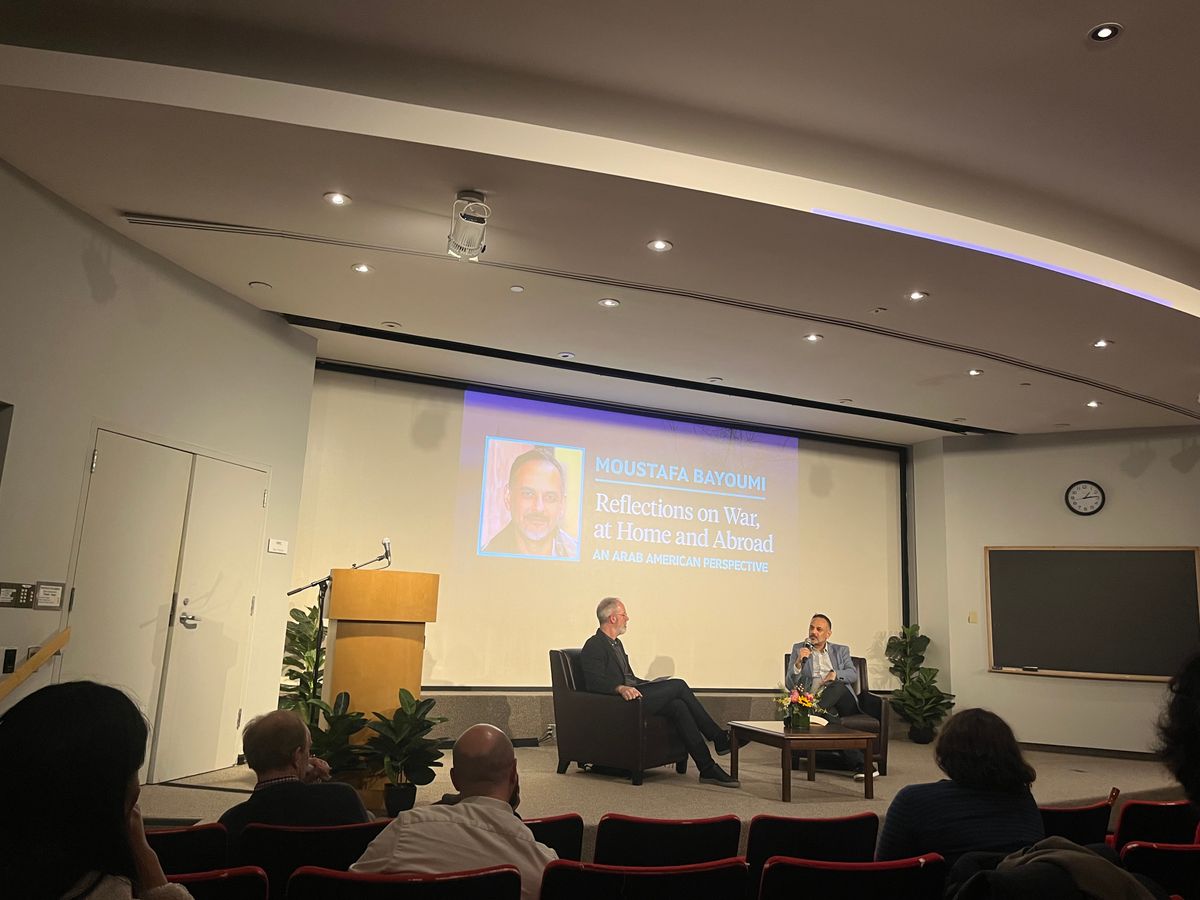Bayoumi Talks Arab-American Experience In Response To War
Author and Brooklyn College professor Moustafa Bayoumi dissected the impacts of Islamophobia and anti-Palestinian sentiment in wartime. He also emphasized how Arab-Americans are often overlooked within U.S. culture.

Moustafa Bayoumi, an English professor at Brooklyn College, gave a talk on how the war in Gaza has impacted Arab Americans in a sparsely populated Stirn Auditorium on Wednesday, March 27.
Bayoumi is the author of “How Does It Feel to be a Problem,” for which he won an American Book Award as well as an Arab American Book Award for nonfiction. He is also a columnist for The Guardian and a regular contributor to The Nation. His work has appeared in The New York Times.
His talk was the second installment of the President’s Office’s “The United States and the Conflict in the Middle East: Domestic Reverberations” speaker series.
Bayoumi recounted the targeting of Palestinians in America and presented the history of Islamophobia in America, and he ended by returning the audience’s attention to the war in Gaza.
In his opening remarks, he emphasized that the current moment is a “difficult time for many people,” and that it is important to have open dialogue, because “universities are places to have difficult conversations during difficult times.”
He then dove into the story of Hannan Shahin and her 6-year-old son Wadea Al-Fayoume. While living in Plainfield, Illinois for two years, the mother and son had a civil relationship with their landlord, Joseph Czuba.
On Oct. 14, 2023, seven days after Hamas’ attack in Israel, Czuba banged on the door to the apartment and confronted Hanan, demanding to know why she wasn’t doing anything to stop the war in Gaza.
When she responded that she was praying for peace, Czuba stabbed her 12 times. When Hanan escaped to the bathroom to call 911, Czuba came back and stabbed her son 26 times.
Czuba was a “churchgoing Air Force Veteran that also listened frequently to conservative talk radio,” which falsely warned of a looming “Global Day of Jihad.”
Bayoumi said that right-wing leaders “went all in, by which I mean crazy,” on the threat of a Global Day of Jihad. For example, Representative Marjorie Taylor Greene posted on social media that she would go and “buy ammo.”
Bayoumi said that fears of the Day of Jihad were global. France instituted a ban on pro-Palestinian protests, and Germany criminalized wearing a keffiyeh, a traditional Arab headdress.
Bayoumi expressed that “Friday the 13th came and went,” and that a young boy had lost his life because of a “71-year-old man profoundly afraid of a fake Global Day of Jihad.”
Bayoumi went on to relay a second story of the shooting of three college-age Palestinian males in Burlington, Vermont.
“[The] atmosphere for Palestinian Americans, Arab Americans, Muslim Americans since the Hamas attacks of October 7, has been tense to say the least,” he said.
Bayoumi argued that to overcome Islamophobia, there must be an “understanding of the origins of our hatreds ... and the reasons for their durability.”
In U.S. history, “anti-Palestinian bigotry has almost always come first, often manifesting into a generalized anti-Arab racism and then morphing, especially after 9/11, into a more generalizable Islamophobia.”
The lack of understanding of Islamophobia, Bayoumi said, fits into a larger narrative of how “Arabs on the whole have been overlooked within U.S. culture.” Arabs are a group that is “still considered white on the census but are certainly dark enough to ethnically profile.”
Bayoumi then turned his attention to the war in Gaza.
“In Gaza, more children have now been killed in four months than the amount of children killed in the last four years of war around the world,”he said.
He also expressed that it is important to recognize the loss of Israelis and to “believe that all lives are sacred.”
Bayoumi ended by arguing that “when it comes to Palestinians, to Arabs, to Muslims in this country and beyond, it feels an awful lot like when we are acknowledged, we come second. Our collective future depends on nobody being second: everybody, including Palestinians, must come first.”
Following the talk, there was a Q&A session hosted by Professor of Anthropology Chris Dole, who teaches courses on the Middle East and North Africa.
One student asked a question that stemmed from lived experience, wondering how Arab students can interact with a Western institution, such as Amherst College.
Bayoumi responded that the first step towards a solution is “widening the number of voices,” and his talk at Amherst was an attempt to begin this process.
Correction, April 3, 2024: A previous version of this article said that three Palestinian men were murdered in Vermont. All three were shot but survived the attack.





Comments ()